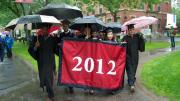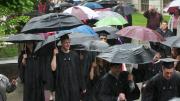Events “conspired to make you an extraordinary group,” President Drew Faust told the class of 2012 in her May 22 Baccalaureate address. Faust recounted the many “firsts” and “lasts” distinctive to this year’s senior class: the first in years to be admitted without the “early action” policy, and the class that finally phased out the Core curriculum. The first to have University-issued “smart cards” and the last to have e-mail addresses ending with fas.harvard.edu. And finally the last class to demonstrate just what one can accomplish with the help of a hot breakfast (“What am I going to do without that joke?” Faust wondered).
But “the purpose of an education is to know when people are talking ‘rot,’” Faust continued, quoting former dean of the Faculty of Arts and Sciences Jeremy Knowles. The president questioned whether thinking one is extraordinary is really true, or helpful. “Believing we are extraordinary is partly rot,” she said. While she assured seniors that “you are remarkable,” she urged consideration of “another and parallel truth: which is that you—and I—are also supremely lucky.”
“No matter how hard we have worked or how many obstacles we have overcome, we are all here in some measure through no cause of our own,” she continued. The good fortune of most of those in the room—herself included—started, she said, with being born into that “small fraction of the global population that has access to fossil fuels, and continues from there to our parents, our schools, our friends, our health….” She continued:
Good fortune is not something we have a right to, but something given to us that we have no claim on. We do not earn grace by being better than others, or even by being good. It is bestowed on any one of us at any moment…and when you acknowledge luck, you recognize your connection to those who did not have the same opportunities.
Even with good luck, Faust said, it is best to be prepared: we are then ready “to recognize and seize chance events.” She quoted Sandy Koufax, the legendary pitcher for the Dodgers (first in Brooklyn, then in Los Angeles): asked what it took to pitch four no-hitters, Koufax answered, “You’ve got to be lucky, but…it’s easier to be lucky…if you’ve got good stuff.”
“So go, extraordinary and lucky class of 2012,” Faust said in closing. “Be mindful of your good fortune….Find something you are not looking for.” She entreated the graduating seniors to keep in touch, delivering her final punchline of the day and alluding to the Harvard baseball team’s now-viral video of team members lip-syncing to a smash-hit pop song: “Write. E-mail. And don’t forget to call me…maybe.”










